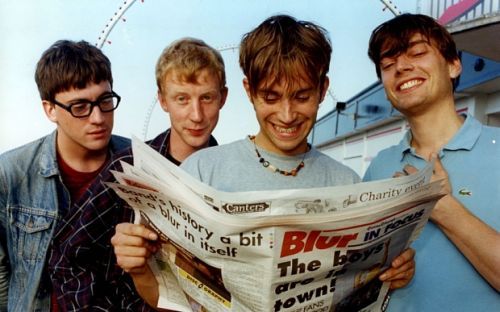
1) Stereotypes; 2) Country House; 3) Best Days; 4) Charmless Man; 5) Fade Away; 6) Top Man; 7) The Universal; 8) Mr. Robinson’s Quango; 9) He Thought of Cars; 10) It Could Be You; 11) Ernold Same; 12) Globe Alone; 13) Dan Abnormal; 14) Entertain Me; 15) Yuko & Hiro
Rating: 4/10
And you wonder why britpop ended up suffering from such a grand hangover...
Key tracks: "Stereotypes", "The Universal", "He Thought of Cars"
The sound of Britpop eating itself. The Great Escape begins with a track called “Stereotypes” and you couldn’t think of a more fitting beginning: it’s as if Blur suddenly became caricatures of themselves overnight.
Blur have successfully escaped their potential legacy as Britpop has-beens due to the style switch and strength of their latter works, but the era looms heavily over The Great Escape. It was released when everything had suddenly escalated: the band were superstars and trend-setters and the media’s frenzy over the Blur vs Oasis “rivalry” was in full steam. Parklife had been a humongous success both commercially and artistically but the band were ready to move on, only to find that they were still expected to head in the same direction. The Great Escape was paraded like it was to be a victory lap, a culmination of the era and the weapon to beat their rivals, but it’s more a Britpop hangover: Blur are already over the sound and they don’t care, but they’re begrudgingly pushed to go with it anyway.
When you stop caring you go on autopilot. As unfair (and plain wrong) as it is to imagine Blur as just a bunch of snotty Britpop lads, The Great Escape is like the band is trying to justify any lazy mental images people have of them. Musically it’s largely Parklife reheats, just with little of the original inspiration or wit left. The songs try to be upbeat and energetic but they’re thoroughly joyless, running through the motions. Lyrically Albarn tries way too hard to tap into the same quirky vein the character studies of Parklife came from, overdoing it to the point of them already coming across cliché. Occasionally there’s an attempt to break free of the conventions as the band try to explore new territories but even they feel unfocused: the sudden style switches of “Mr. Robinson’s Quango” and the hazily dreaming “Yuko & Hiro” are enough to raise an ear in attention but as songs they’re just not too captivating: album highlights that in another era would be clear b-side filler. Somewhat amusingly it’s the before-mentioned “Stereotypes” that’s actually one of the genuinely better cuts, rocking out with a little bit of life and swagger that’s otherwise missing from the album.

To top it off there’s “Country House” – not only one of the worst things Blur ever packed into their albums but also one of the most soulless creations that came out of the Britpop. It’s undeniably catchy, sure, but it does it so cheaply as it shamelessly tries to pack in a hundred different things to catch attention in hope that something sticks. Nursery rhyme level choruses, sing-along encouraging backing vocals, melodic Beatles nods, lyrical Oasis nods, horn sections, la-la-la sing-alongs and crammed-in vocal yelps all fight for attention with eachother in what’s the the pop song equivalent of trying to close a suitcase that’s way too full. Every now and then it appears in my head, I think maybe I’ve been too harsh on it and it’s probably better than I remember it being, but upon re-listens it always proves its nature time and time again. It’s a cacophonic mess and the fact that it was a number one speaks more about the intensity of the era (it was the chosen single to battle head-to-head against Oasis’ single at the time) than the actual quality of the song.
There’s a one mighty bright spot though, and that’s “The Universal”. If the rest of The Great Escape showcases its era at its most cynical and just where it went wrong, here’s where it went gloriously right. “The Universal” is a beautiful, beautiful torch song in such a timeless way – you can tell from the first listen that it’s a genuine classic of the kind that will live on for decades, and it has. It might be dystopian tale of futuristic drugs, but it’s the single song on the album where Albarn sounds earnest and like he genuinely gives a damn. The strings swell, the chorus explodes, all the lights flash and there’s not a dry eye in the house. Its only downside is that a song of its magnitude would really have deserved a better place to sit in.
Otherwise… well, it’s hard for me to say anything of great detail about The Great Escape. I’ve owned it for years and I had heard it a number of times before it came to my collection. I also regularly put it on out of curiosity and to see if I’ve not just misjudged it in the past, and it’s still left barely any imprint after all these years. Outside “Country House” it’s not even particularly awful, it’s just completely uninspired, fluctuating between dull and misjudged. You come off it disliking the era no matter the nostalgia I might have for the 90s and feeling worse about the band despite the great albums lined up on the same shelf. It’s a lazy album that undermines the band who perform it. The only great escape that resulted from it is how Blur decided to kill off the trend they helped to create on their next release and move away somewhere completely different.
No comments:
Post a Comment